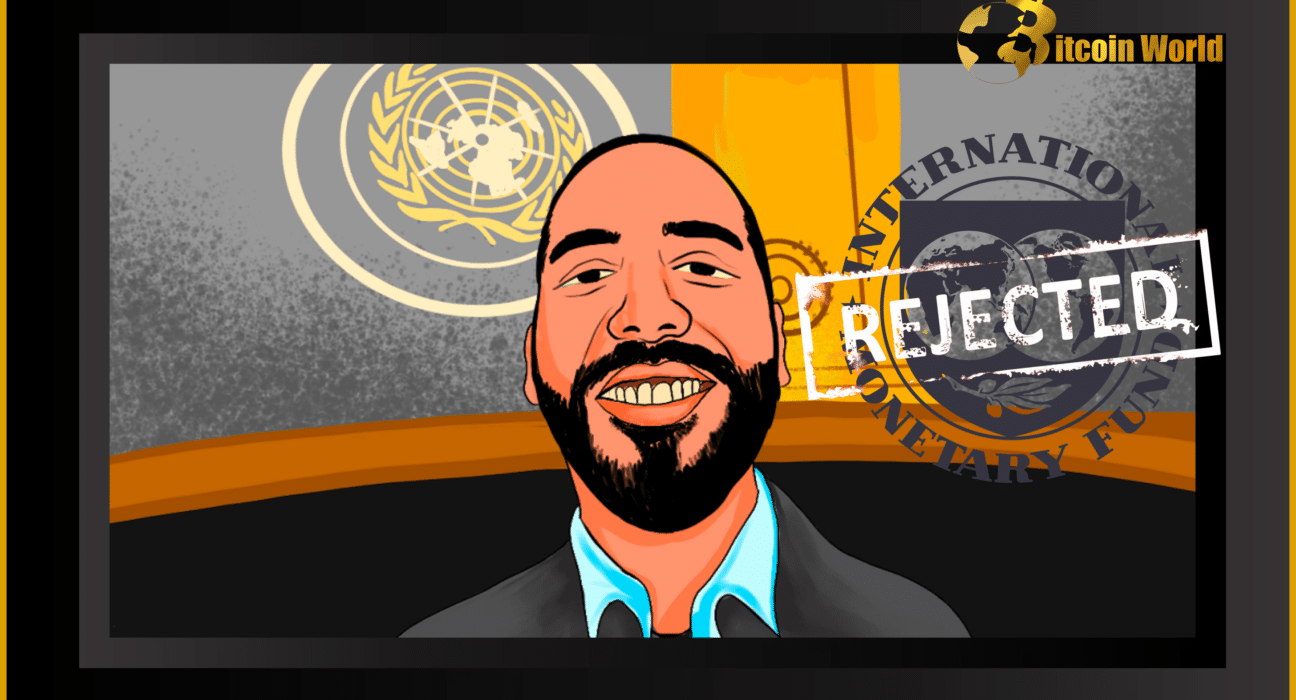Hold onto your hats, crypto enthusiasts! The Bitcoin rollercoaster just took another exciting turn. As Bitcoin flirts with two-week highs, all eyes are on El Salvador, the nation that boldly embraced Bitcoin as legal tender. Why the buzz? Because El Salvador just delivered a resounding ‘No, thanks!’ to the International Monetary Fund (IMF), who politely (or not so politely) suggested they ditch Bitcoin. Let’s dive into this fascinating standoff and see what it means for El Salvador, Bitcoin, and the future of crypto adoption.
IMF Says ‘Drop Bitcoin’, El Salvador Says ‘Nah’: The Sovereign Standoff
Just days ago, the IMF publicly recommended that El Salvador repeal its Bitcoin Law. Their concerns? The usual suspects: financial stability, consumer protection, and the potential for illicit activities. Basically, the IMF sees Bitcoin’s volatility as a recipe for economic instability in El Salvador.
But El Salvador, under the leadership of President Nayib Bukele, isn’t backing down. Treasury Minister Alejandro Zelaya firmly stated that adopting Bitcoin was a matter of national “sovereignty.” In simpler terms, El Salvador is saying, ‘We make our own decisions, thank you very much.’
Zelaya’s message was crystal clear:
“Countries are sovereign nations and they take sovereign decisions about public policy. No international organization is going to make us do anything, anything at all.”
Boom! Mic drop moment? Perhaps. This bold stance highlights a growing tension between traditional financial institutions and nations exploring alternative financial paths like cryptocurrency.
Why is the IMF Worried About El Salvador’s Bitcoin Bet?
Let’s break down the IMF’s concerns. They aren’t exactly thrilled about Bitcoin becoming legal tender. Here’s a quick rundown of their main arguments:
- Financial Instability: Bitcoin’s price is known for its wild swings. The IMF worries this volatility could destabilize El Salvador’s economy.
- Financial Integrity: They’re concerned about Bitcoin’s potential use in money laundering and illicit activities.
- Consumer Protection: The IMF points out the risks to consumers due to Bitcoin’s price fluctuations and the lack of regulatory oversight in the crypto space (in some regions).
The IMF even hinted at potential consequences, suggesting El Salvador’s Bitcoin policy could jeopardize future loan agreements. Ouch.
El Salvador’s Crypto Comeback: Bitcoin Bonds to the Rescue?
But here’s where things get interesting. El Salvador seems to have a Plan B, and it involves… more Bitcoin! Crypto industry experts believe El Salvador might be less reliant on IMF loans than before, thanks to innovative financial instruments like the Bitcoin Bond.
Marcus Sotiriou, an analyst at GlobalBlock, a UK-based digital asset broker, explains:
“It seems that El Salvador may not need the coercive loans from the IMF any longer by issuing the innovative bitcoin Bond, which allows them to raise funds to set up mining infrastructure.”
Essentially, El Salvador is looking to raise funds through Bitcoin-backed bonds, potentially bypassing the need for traditional loans from institutions like the IMF. This is a bold move that could reshape how nations finance themselves in the future.
Bukele’s Meme Response: A Picture is Worth a Thousand Sarcastic Tweets
President Nayib Bukele, known for his savvy social media presence, responded to the IMF’s request in a way only he could – with a meme. He tweeted a classic Simpsons meme, accompanied by the caption: “I see you, IMF. That’s very nice.”
The meme speaks volumes. It’s a lighthearted yet firm dismissal of the IMF’s pressure, showcasing El Salvador’s unwavering commitment to its Bitcoin experiment.
Bitcoin Price Reacts: Is El Salvador’s Defiance a Bullish Signal?
Interestingly, Bitcoin’s price saw a notable uptick following El Salvador’s rejection of the IMF’s advice. Could this be a coincidence? Perhaps. Or maybe, the market is interpreting El Salvador’s stance as a sign of growing crypto adoption and resilience against traditional financial gatekeepers. This recent crypto rally has injected over a quarter of a trillion dollars back into the overall market, signaling renewed investor confidence.
What’s Next for El Salvador and Bitcoin?
El Salvador’s Bitcoin experiment is far from over. It’s a real-world case study in crypto adoption, with significant implications for other nations considering similar moves. Here are a few key takeaways and questions to ponder:
- Sovereignty vs. Global Financial Norms: El Salvador’s defiance raises questions about national sovereignty in the face of international financial institutions’ recommendations.
- Bitcoin Bonds: A New Funding Model? The success (or failure) of El Salvador’s Bitcoin Bonds could pave the way for alternative funding models for nations, potentially reducing reliance on traditional loans.
- Crypto Adoption in Developing Economies: El Salvador’s experience will be closely watched by other developing nations exploring crypto as a tool for financial inclusion and economic growth.
- Volatility and Long-Term Strategy: Can El Salvador effectively manage Bitcoin’s volatility and integrate it into its long-term economic strategy?
Your Thoughts?
What do you make of El Salvador’s bold move? Should they have listened to the IMF, or is their sovereign stance on Bitcoin a step in the right direction? Share your opinions in the comments below!
Disclaimer: The information provided is not trading advice, Bitcoinworld.co.in holds no liability for any investments made based on the information provided on this page. We strongly recommend independent research and/or consultation with a qualified professional before making any investment decisions.


